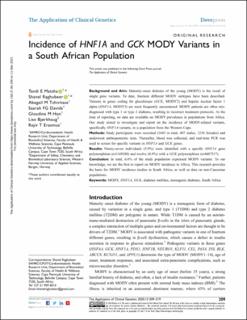Incidence of HNF1A and GCK MODY Variants in a South African Population
Matsha, Tandi E; Raghubeer, Shanel; Tshivhase, Abegail M; Davids, Saarah FG; Hon, Gloudina M; Bjørkhaug, Lise; Erasmus, Rajiv T
Journal article, Peer reviewed
Published version

View/
Date
2020Metadata
Show full item recordCollections
Original version
Matsha, T. E., Raghubeer, S., Tshivhase, A. M., Davids, S. F. G., Hon, G. M., Bjørkhaug, L., & Erasmus, R. T. (2020). Incidence of HNF1A and GCK MODY Variants in a South African Population. The Application of Clinical Genetics, Volume 13, 209-219. 10.2147/TACG.S281872Abstract
Background and Aim: Maturity-onset diabetes of the young (MODY) is the result of single gene variants. To date, fourteen different MODY subtypes have been described. Variants in genes coding for glucokinase (GCK, MODY2) and hepatic nuclear factor 1 alpha (HNF1A, MODY3) are most frequently encountered. MODY patients are often misdiagnosed with type 1 or type 2 diabetes, resulting in incorrect treatment protocols. At the time of reporting, no data are available on MODY prevalence in populations from Africa. Our study aimed to investigate and report on the incidence of MODY-related variants, specifically HNF1A variants, in a population from the Western Cape.
Methods: Study participants were recruited (1643 in total, 407 males, 1236 females) and underwent anthropometric tests. Thereafter, blood was collected, and real-time PCR was used to screen for specific variants in HNF1A and GCK genes.
Results: Ninety-seven individuals (5.9%) were identified with a specific HNF1A gene polymorphism (rs1169288) and twelve (0.9%) with a GCK polymorphism (rs4607517).
Conclusion: In total, 6.6% of the study population expressed MODY variants. To our knowledge, we are the first to report on MODY incidence in Africa. This research provides the basis for MODY incidence studies in South Africa, as well as data on non-Caucasian populations.
